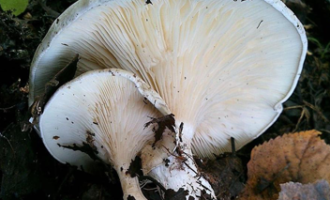Wash the cherries, soak in salted water for 2 hours, then boil for 20 minutes.
How to cook ivyshniki
You will need – cherries, water, salt
1. Clear cherries from grass and other forest debris.
2. Rinse the cherries to remove small debris and soil residue.
3. Put in a bowl at least twice as large in volume as the available mushrooms.
4. Pour cold water, add salt (one teaspoon per liter of water) and leave for two hours to remove the mealy taste.
5. Drain the water, wash the cherries again.
6. Pour new water and put on the stove, turning on medium heat.
7. After the cherries boil, reduce the fire and cook for 20 minutes.
8. Put the finished cherries in a colander and let the water drain.
Your cherries are ready!
Mushroom cherry sauce
Products
Fresh cherries – 400 grams
Onions – 80 grams
Butter (can be replaced with margarine) – 60 grams Thick sour
cream or cream with a fat content of 33% – 150 grams
Flour – 2 tablespoons
Salt – 1 teaspoon
How to make sour cherry sauce
1. Peel, soak and boil sour cherries; cut into pieces 1-2 centimeters.
2. Put the boiled cherries in a dry frying pan and put on a small fire.
3. Cut the onion into cubes with a side of one centimeter.
4. As soon as the water evaporates from the mushrooms, add butter or margarine there, and simmer for five to six minutes.
5. Add onion, salt to taste.
6. When onions and cherries become golden, add sour cream or cream.
7. To make the sauce thicker, add flour and simmer everything together for 5-10 minutes, stirring constantly.
Tasty Facts
– After picking mushrooms, they must be dried in the sun or in the air. Before using dried mushrooms, soak them for forty minutes in cold water, after which they increase in volume by 2-3 times. This water must be drained and filled with new water before cooking. So, periodically washing and changing the water every 6 hours, mushrooms can be stored in water for up to two days.
– The second name of ivishnya is a bower. In books it is sometimes referred to as the common clitopilus.
– Cherries are most often found in broadleaf forests or in thick grass at the edge of a forest. You can also find this mushroom in gardens, kitchen gardens or horticulture with a large number of pink-flowering trees (cherry, plum, pear). You can collect cherries from July to October, until the first serious cold snap.
– Icherry has a lamellar hat with a diameter of up to ten centimeters of white or yellowish color . The older the mushroom, the brighter the gray tint appears. The shape of the cap changes with the age of the fungus. In young cherries, it is rounded with wavy edges bent down; with age, the cap becomes flat – convex, then flat and even concave. If you press on the hat, it immediately darkens. The leg has a cylindrical shape and tapers towards the base, sometimes it can bend. A powdery coating is barely noticeable on the upper part of the stem, and the dense and soft pulp of the mushroom has a strong mealy smell, characteristic only of these mushrooms.
– Cherry is very easy to confuse with poisonous talker or other poisonous mushrooms. Cherries can be distinguished from govorushka by pinking plates, and unlike pink-colored poisonous mushrooms, the plates of cherry go down very low along the stem.
— Cherry can be dried, boiled or fried. This mushroom is not suitable for pickling or pickling, because it has a very tender pulp.
– The calorie content of fresh cherries is only 38 kcal per 100 grams. These mushrooms contain a sufficient amount of phosphorus compounds that are useful for the human body – they have a beneficial effect on the nervous system, blood circulation in the brain improves. Raw cherries contain a large amount of vitamin C, but during processing a significant part of it is lost.
– Icherries are also bred artificially, for sale. To do this, in the fall, on dry felled or broken trees, an incision is made across the trunk with a depth of three to five centimeters. Grooves are brought to these trees, through which rainwater flows there, or grooves are brought from the nearest reservoir. After one or two months, mushrooms appear at the site of the incisions, the trade name of which is oyster mushrooms. Oyster mushrooms bought in a store do not need to be soaked before cooking and stored in water. Oyster mushrooms can be distinguished from forest cherries by their lighter cap color and more “rubber” consistency. Another way to breed willows is on farms where conditions are artificially created for the growth of oyster mushrooms. Hay bales, suspended in a room with a special temperature regime and the necessary humidity, replace tree trunks for oyster mushrooms.
